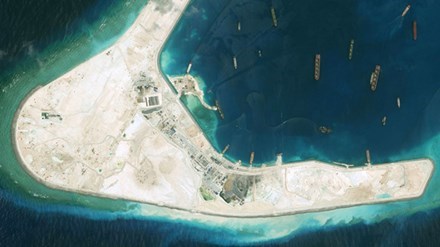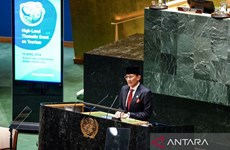US says China’s island building in East Sea hurts eco-environment
 China illegally builds artificial islands in Vietnam's Truong Sa (Spratly) archipelago (Photo: DigitalGlobe)
China illegally builds artificial islands in Vietnam's Truong Sa (Spratly) archipelago (Photo: DigitalGlobe) The April 12 report prepared by the US-China Economic and Security Review Commission said China ’s activities in the East Sea are particularly worrisome due to the scale and speed as well as the biodiversity of the area and the significance of Truong Sa (Spratly) archipelago to the regional ecology.
It added that from late 2013 to October 2015, China reclaimed about 3,000 acres (12 sq. km) of land on seven features that it illegally occupies in the Spratly Islands.
Chinese dredgers stir up plumes of sand and silt that damage coral tissue and block sunlight – the survival source of coral reefs, the report said, adding that the damage could also impact the health of fisheries in the coastal areas of the East Sea.
The Chinese government has not published sufficient information about its assessment of the environmental impact of the island building, according to the report.
Regarding the illegal activities of China in the East Sea , Foreign Ministry Spokesperson Le Hai Binh reiterated Vietnam ’s indisputable sovereignty over Truong Sa (Spratly) and Hoang Sa (Paracel) archipelagos.
Despite the protest and concern of Vietnam and the international community, China has continued to take actions which not only seriously violate Vietnam’s sovereignty but also increase militarisation in the East Sea and threaten peace and stability in the region as well as navigation and aviation freedom, safety and security in the East Sea, he stressed.
He confirmed that Vietnam resolutely opposes activities that seriously infringe Vietnamese sovereignty and requests China to act responsibly and constructively in the maintenance of peace and stability in the region and the world, on the basis of respecting international law, especially the 1982 UN Convention on the Law of the Sea (UNCLOS) and the Declaration on the Conduct of Parties in the East Sea (DOC).-VNA











